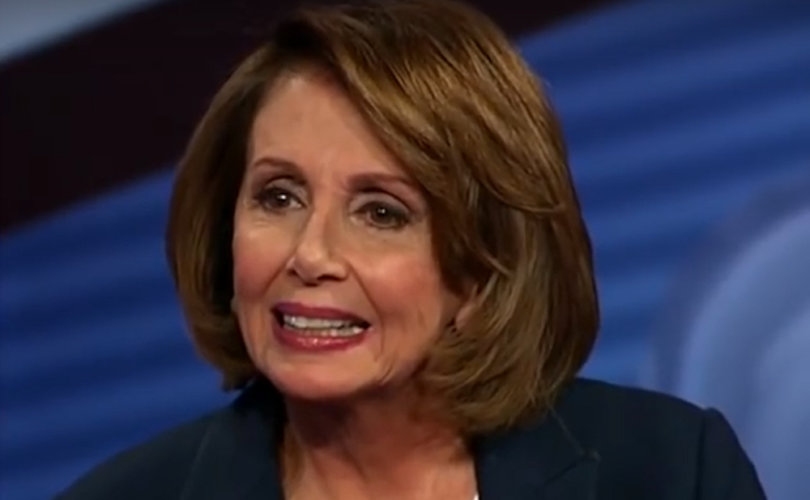WASHINGTON, D.C., April 25, 2018 (LifeSiteNews) – House Minority Leader Nancy Pelosi once again waded into her party’s civil war over abortion litmus tests, this time arguing that acceptance of pro-life Democrats ultimately serves pro-abortion interests.
“I get some heat for saying that not everybody has to be” pro-abortion, Pelosi told a crowd of George Washington University students Tuesday. “When the day comes when we can say we don’t want any of our voters to be anti-choice, then I think we’d have a right to say that we don’t want any of our candidates to be anti-choice.”
“It’s a very high priority for us to protect a woman’s right to choose,” she continued, but it is also important to recognize that lawmakers ultimately must represent the views of their districts, even if they don’t align with the national party platform.
Pelosi referenced her endorsement of Rep. Dan Lipinski of Illinois, a pro-life Democrat who warded off pro-abortion primary challenger Marie Newman in March. The Democratic Congressional Campaign Committee refused to endorse Lipinski.
Illinois House Democrats Jan Schakowsky and Luís Gutierrez, as well as left-wing groups including EMILY’s List, NARAL, and MoveOn.org endorsed his opponent.
Some pro-life figures and groups like the Susan B. Anthony List supported Lipinski as a “pro-life hero,” but Pelosi suggested that Lipinski’s victory would ultimately help a pro-abortion majority retake the U.S. House of Representatives.
“I supported him. I took heat for it. He’s pro-life,” she said. “But we will have a pro-choice gavel when we win the Congress. We need to have at least 218 votes to achieve that.”
Individual lawmakers can vote against their party’s position on any given piece of legislation, but their party affiliation decides which party’s leaders have majority control over the House or Senate. This influences legislation’s fortunes in various ways, including scheduling votes, setting procedural rules, controlling committees, and more.
“[A]t the legislative level, political parties more than individuals determine which laws see the light of day,” Life Training Institute president Scott Klusendorf argued in 2012. “If a party committed to elective abortion controls the [House], it will squash pro-life bills and promote pro-abortion ones. Even if that pro-abortion party has a few pro-life members, those members will likely never get to vote on a pro-life bill unless their party is not in power!”
“Remember, the Speaker of the House ultimately determines the legislative agenda and if the party committed to elective abortion controls the chamber, its candidate for speaker will inevitably be pro-abortion,” Klusendorf continued. “Nevertheless, these pro-life members vote for their party’s candidate for speaker, which all but guarantees that pro-life bills never see the light of day. In most cases, then, they aren’t reforming their party’s pro-abortion stance; they’re enabling it.”
The Democratic Party has hardened its pro-abortion stance over the past several election cycles. The party’s 2012 convention removed from its national platform rhetoric calling for abortion to be made “rare,” and the 2016 version added language declaring abortion a “core aspect” of all Americans’ “well-being,” and calling for the federal government to overturn state pro-life laws.

